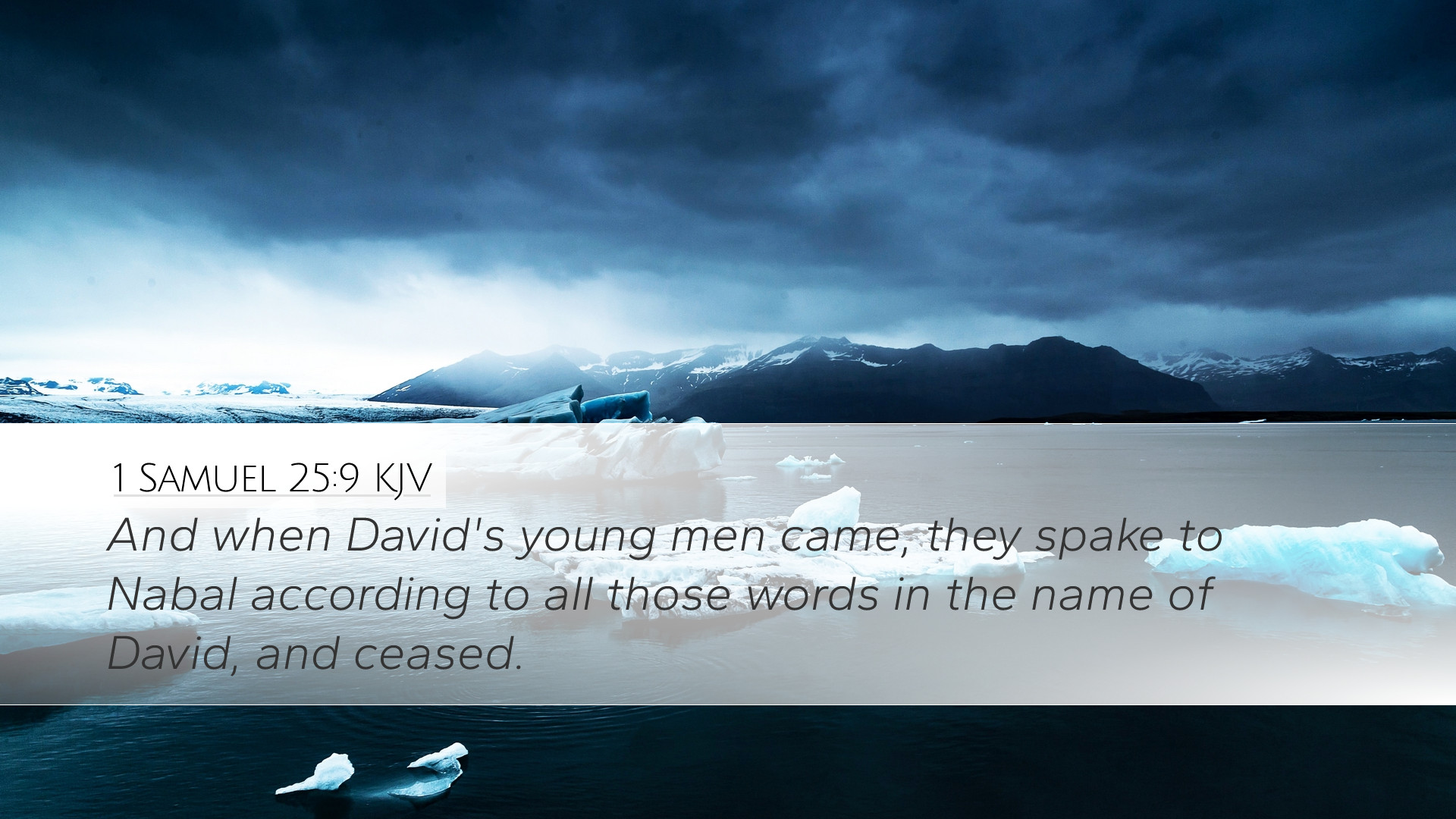Commentary on 1 Samuel 25:9
The verse 1 Samuel 25:9 reads: "So when David's young men came, they spoke to Nabal according to all these words in the name of David, and waited." This verse captures a critical moment in the narrative of David and Nabal, revealing fundamental themes of honor, human relationships, and divine sovereignty.
Context Overview
This chapter unfolds during David's time in the wilderness, evoking significant discussions about leadership principles and the moral implications of interaction between individuals of varying social standing. The verse serves as a bridge in the story, connecting David's request for provisions with Nabal's ensuing response.
Insights from Public Domain Commentaries
Matthew Henry’s Commentary
Matthew Henry comments on this passage with an emphasis on David's humility and restraint in approaching Nabal. Henry suggests that David's young men were dispatched not only for the purpose of obtaining provisions but also to establish a peaceful rapport, indicating a recognition of social protocol (Henry, 1706).
Henry further explains: "They were sent in the name of David, the anointed future king, which should have commanded respect. This refusal of a courteous request from one of the greatest leaders reflects a grave misunderstanding of honor and acknowledgment of one's status."
Albert Barnes’ Notes on the Bible
Albert Barnes highlights the strategic nature of David’s request. According to Barnes, the young men’s expectations of hospitality stem from the customary practices of the time, where a rich man would use his resources to support those in need.
-
David's Diplomatic Approach: Barnes notes that David utilized an ethical appeal, emphasizing his service to Nabal’s shepherds and avoiding direct confrontation.
-
Human Relations Dynamics: The young men’s waiting indicates their respect for the customary reply protocol, showcasing their patience and reverence—demonstrating a relational stance amidst potential conflict.
Adam Clarke’s Commentary
Adam Clarke provides a broader interpretation focusing on the character of Nabal. He outlines that Nabal’s attitude toward David was not only a personal affront but also representative of a larger spiritual dichotomy.
Clarke states, "Nabal's name means ‘fool’ in Hebrew, and his actions confirm this. He embodies the pride of the rich who refuse to acknowledge their moral obligations to others." This illustrates a vital aspect of biblical morality, where wealth must serve a higher purpose than mere indulgence.
Theological Implications
This passage raises profound questions concerning authority, respect, and the nature of leadership. David, who is in a position of future kingship, exercises restraint and honor in a volatile situation. His young men await Nabal’s response, showcasing an attitude of expectation amidst uncertainty—demonstrating the importance of patience and humility in leadership.
Leadership Dynamics
-
Servant Leadership: David’s actions reflect the notion of servant leadership, where a leader approaches others with humility, even when he holds a position of power.
-
Response to Rejection: The dynamics of how David deals with Nabal's future responses can serve as a case study in how leaders should handle rejection or conflict, emphasizing reliance on divine judgment rather than personal vengeance.
Conclusion
1 Samuel 25:9 opens up a rich dialogue on interpersonal relationships, ethics, and the often complicated nature of human interactions, particularly in light of status and power dynamics. The insights drawn from Matthew Henry, Albert Barnes, and Adam Clarke serve not only to illuminate the text but also to encourage a deeper understanding of the principles of leadership and moral responsibility that are ever-relevant in the life of a believer.
As pastors, students, theologians, and Bible scholars engage with this verse, the call to practice humility and patience in the face of provocation stands out as a timeless lesson that applies equally to contemporary conflicts.


